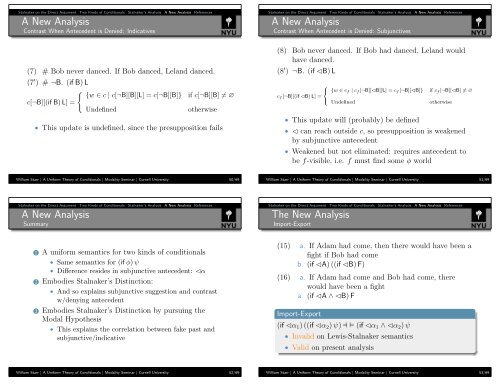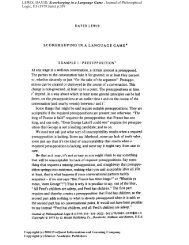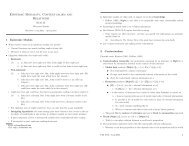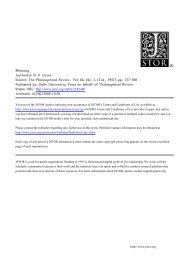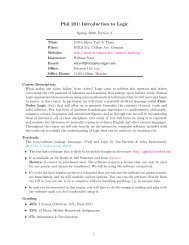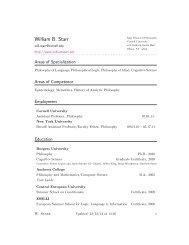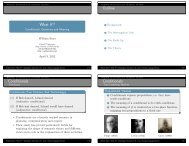A Uniform Theory of Conditionals: Beyond Stalnaker - Will Starr
A Uniform Theory of Conditionals: Beyond Stalnaker - Will Starr
A Uniform Theory of Conditionals: Beyond Stalnaker - Will Starr
You also want an ePaper? Increase the reach of your titles
YUMPU automatically turns print PDFs into web optimized ePapers that Google loves.
<strong>Stalnaker</strong> on the Direct Argument Two Kinds <strong>of</strong> <strong>Conditionals</strong> <strong>Stalnaker</strong>’s Analysis A New Analysis References<br />
A New Analysis<br />
Contrast When Antecedent is Denied: Indicatives<br />
(7) # Bob never danced. If Bob danced, Leland danced.<br />
(7 ′ ) # ¬B. (if B) L<br />
{ {w ∈ c | c[¬B][B][L] = c[¬B][B]} if c[¬B][B] ≠ ∅<br />
c[¬B][(if B) L] =<br />
Undefined<br />
otherwise<br />
• This update is undefined, since the presupposition fails<br />
<strong>Stalnaker</strong> on the Direct Argument Two Kinds <strong>of</strong> <strong>Conditionals</strong> <strong>Stalnaker</strong>’s Analysis A New Analysis References<br />
A New Analysis<br />
Contrast When Antecedent is Denied: Subjunctives<br />
(8) Bob never danced. If Bob had danced, Leland would<br />
have danced.<br />
(8 ′ ) ¬B. (if ✁B) L<br />
⎧<br />
⎨ {w ∈ c f | c f [¬B][✁B][L] = c f [¬B][✁B]} if c f [¬B][✁B] ≠ ∅<br />
c f [¬B][(if ✁B) L] =<br />
⎩<br />
Undefined<br />
otherwise<br />
• This update will (probably) be defined<br />
• ✁ can reach outside c, so presupposition is weakened<br />
by subjunctive antecedent<br />
• Weakened but not eliminated: requires antecedent to<br />
be f-visible, i.e. f must find some φ world<br />
<strong>Will</strong>iam <strong>Starr</strong> | A <strong>Uniform</strong> <strong>Theory</strong> <strong>of</strong> <strong>Conditionals</strong> | Modality Seminar | Cornell University 50/69<br />
<strong>Will</strong>iam <strong>Starr</strong> | A <strong>Uniform</strong> <strong>Theory</strong> <strong>of</strong> <strong>Conditionals</strong> | Modality Seminar | Cornell University 51/69<br />
<strong>Stalnaker</strong> on the Direct Argument Two Kinds <strong>of</strong> <strong>Conditionals</strong> <strong>Stalnaker</strong>’s Analysis A New Analysis References<br />
A New Analysis<br />
Summary<br />
1 A uniform semantics for two kinds <strong>of</strong> conditionals<br />
• Same semantics for (if φ) ψ<br />
• Difference resides in subjunctive antecedent: ✁α<br />
2 Embodies <strong>Stalnaker</strong>’s Distinction:<br />
• And so explains subjunctive suggestion and contrast<br />
w/denying antecedent<br />
3 Embodies <strong>Stalnaker</strong>’s Distinction by pursuing the<br />
Modal Hypothesis<br />
• This explains the correlation between fake past and<br />
subjunctive/indicative<br />
<strong>Stalnaker</strong> on the Direct Argument Two Kinds <strong>of</strong> <strong>Conditionals</strong> <strong>Stalnaker</strong>’s Analysis A New Analysis References<br />
The New Analysis<br />
Import-Export<br />
(15) a. If Adam had come, then there would have been a<br />
fight if Bob had come<br />
b. (if ✁A) ((if ✁B) F)<br />
(16) a. If Adam had come and Bob had come, there<br />
would have been a fight<br />
a. (if ✁A ∧ ✁B) F<br />
Import-Export<br />
(if ✁α 1 ) ((if ✁α 2 ) ψ)<br />
<br />
(if ✁α 1 ∧ ✁α 2 ) ψ<br />
• Invalid on Lewis-<strong>Stalnaker</strong> semantics<br />
• Valid on present analysis<br />
<strong>Will</strong>iam <strong>Starr</strong> | A <strong>Uniform</strong> <strong>Theory</strong> <strong>of</strong> <strong>Conditionals</strong> | Modality Seminar | Cornell University 52/69<br />
<strong>Will</strong>iam <strong>Starr</strong> | A <strong>Uniform</strong> <strong>Theory</strong> <strong>of</strong> <strong>Conditionals</strong> | Modality Seminar | Cornell University 53/69


